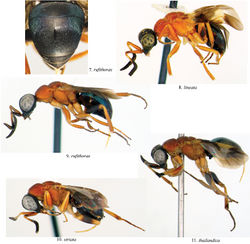Atoposega lineata
| Notice: | This page is derived from the original publication listed below, whose author(s) should always be credited. Further contributors may edit and improve the content of this page and, consequently, need to be credited as well (see page history). Any assessment of factual correctness requires a careful review of the original article as well as of subsequent contributions.
If you are uncertain whether your planned contribution is correct or not, we suggest that you use the associated discussion page instead of editing the page directly. This page should be cited as follows (rationale):
Citation formats to copy and paste
BibTeX: @article{Kimsey2014ZooKeys409, RIS/ Endnote: TY - JOUR Wikipedia/ Citizendium: <ref name="Kimsey2014ZooKeys409">{{Citation See also the citation download page at the journal. |
Ordo: Hymenoptera
Familia: Chrysididae
Genus: Atoposega
Name
Atoposega lineata (Krombein) – Wikispecies link – Pensoft Profile
- Atopogyne lineata Krombein, 1957: 186. Holotype female; Borneo: Sandakan (USNM).
Material examined
Malaysian Borneo: Sandakan. Only the type series has been seen.
Diagnosis
This species most closely resembles Atoposega simulans and less so Atoposega thailandica. All lack the dense U-shaped scratches on metasomal tergum II. Atoposega lineata and Atoposega thailandica both have banded wings, but Atoposega lineata can be distinguished by the hindocellus separated from the eye margin by more than one diameter and flagellomere I less than 4× as long as broad.
Female description
Body (Fig. 8): length 6 mm. Head: face (Fig. 2); scapal basin cross-ridged medially; frons with punctures contiguous; malar space 3 midocellus diameters long; head 0.8× as long as wide; midocellus 2.6–2.7 midocellus diameters from ocular margin in front view; ocelli arranged in triangle broader between hindocelli than between hind and midocelli; hindocellus separated from ocular margin by 1.5 ocellar diameters in dorsal view; clypeus somewhat convex apically; subantennal distance 0.8 midocellus diameters: flagellomere I length 3× breadth; flagellomeres II and III 0.7× as long as broad; flagellomere XI 1.2× as long as broad. Mesosoma: pronotal, scutal and scutellar punctures large, contiguous, separated by longitudinal ridges; pronotum and scutum subequal in length; scutum with notauli well-developed anteriorly; mesopleural punctures contiguous; metanotum 1.3× as long as scutellum, medial enclosure coarsely areolate, with medial ridge; propodeal dorsal surface coarsely areolate, posterior surface with medial longitudinal carina, enclosure smooth, impunctate on either side; forefemur with tiny contiguous punctures dorsally, punctures becoming separated by 1 puncture diameter ventrally; hindfemur with tiny contiguous punctures dorsally, punctures becoming larger and contiguous ventrally, with longitudinal impunctate band ventrally; metapleuron and propodeal side coarsely cross-ridged. Metasoma: tergum I polished, impunctate; tergum II polished, impunctate medially from anterior to posterior margins, laterally with dense, tiny punctures and fine, dense longitudinal scratches; terga III-IV polished with scattered tiny punctures; sternum II with punctures tiny, 5–10 puncture diameters apart, III-IV punctures tiny, contiguous to 0.5 puncture diameters apart. Color: head black; mesosoma red; propodeum black dorsally and posteriorly, laterally and lateral tooth partly to completely red; wings banded, dark brown-tinted, with un-tinted band across wing at Rs and near base; antenna with scape, pedicel red, flagellomere I paler red dorsally, browner ventrally, flagellomeres II-IX dark brown; legs red, midcoxae and hindfemora may have brown lateral spot; metasoma black with faint metallic green tints.
Taxon Treatment
- Kimsey, L; 2014: Reevaluation of the odd chrysidid genus Atoposega Krombein (Hymenoptera, Chrysididae, Amiseginae) ZooKeys, 409: 35-47. doi
Images
|

